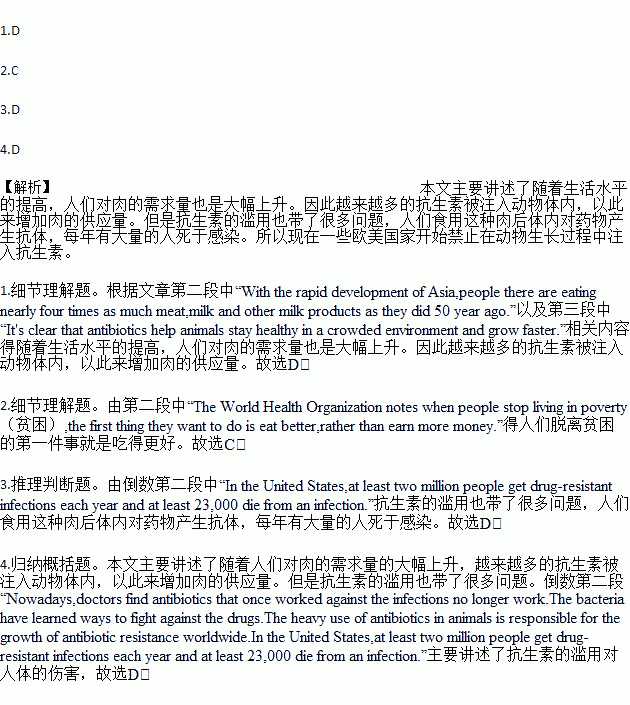题目内容
A new study has found the amount of antibiotics(抗生素)given to farm animals is expected to increase by two-thirds over the next 15 years.Researchers are linking the growing dependence on the drugs to the increasing need for meat,milk and eggs.However,the drugs could quicken the development of antibiotic-resistant infections(感染).Such infections are already a major public,health concern in the United States.
The World Health Organization notes when people stop living in poverty(贫困),the first thing they want to do is eat better,rather than earn more money.For most people,that means their diet should contain more meat.With the rapid development of Asia,people there are eating nearly four times as much meat,milk and other milk products as they did 50 year ago.
To meet the need,farmers have put many animals into smaller spaces.As the animals are crowded together,the easiest way to deal with some of the problems d crowding is to give them antibiotics.It's clear that antibiotics help animals stay healthy in a crowded environment and grow faster.But bacteria can develop resistance to the drugs gradually.
Nowadays,doctors find antibiotics that once worked against the infections no longer work.The bacteria have learned ways to fight against the drugs.The heavy use of antibiotics in animals is responsible for the growth of antibiotic resistance worldwide.In the United States,at least two million people get drug-resistant infections each year and at least 23,000 die from an infection.
Europe has banned the use of antibiotics to increase animal growth.And the United States is hoping to persuade farmers to stop using antibiotics for that purpose.
1.What accounts for the increasing amount of antibiotics given to farm animals?
A. The desire for new drugs. B. The less effective antibiotics.
C. The outdated farm technology. D. The need for more various foods.
2.What do most people want to do first when they get rid of poverty according to the WHO?
A. Making a lot of money. B. Focusing more on health.
C. Having more meat in their diet. D. Living in a better environment.
3.What can be inferred from the passage?
A. Antibiotics do harm to animals.
B. Antibiotics help animals stay healthy.
C. Antibiotics are used heavily in Europe.
D. Antibiotic-resistant bacteria spread to people.
4.What's the passage mainly about?
A. A new way of raising farm animals.
B. The advantages of using antibiotics.
C. The reason for banning the use of antibiotics.
D. The negative effect of antibiotics in farm animals.
 同步拓展阅读系列答案
同步拓展阅读系列答案
